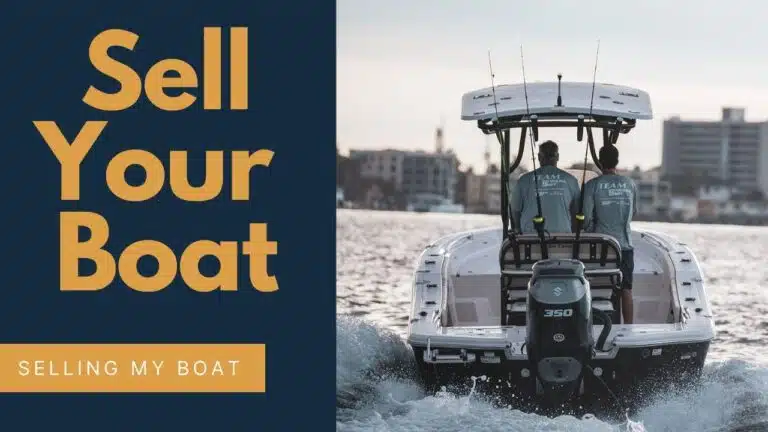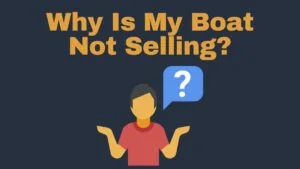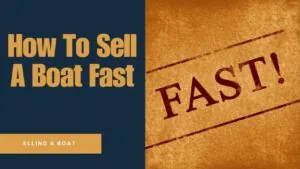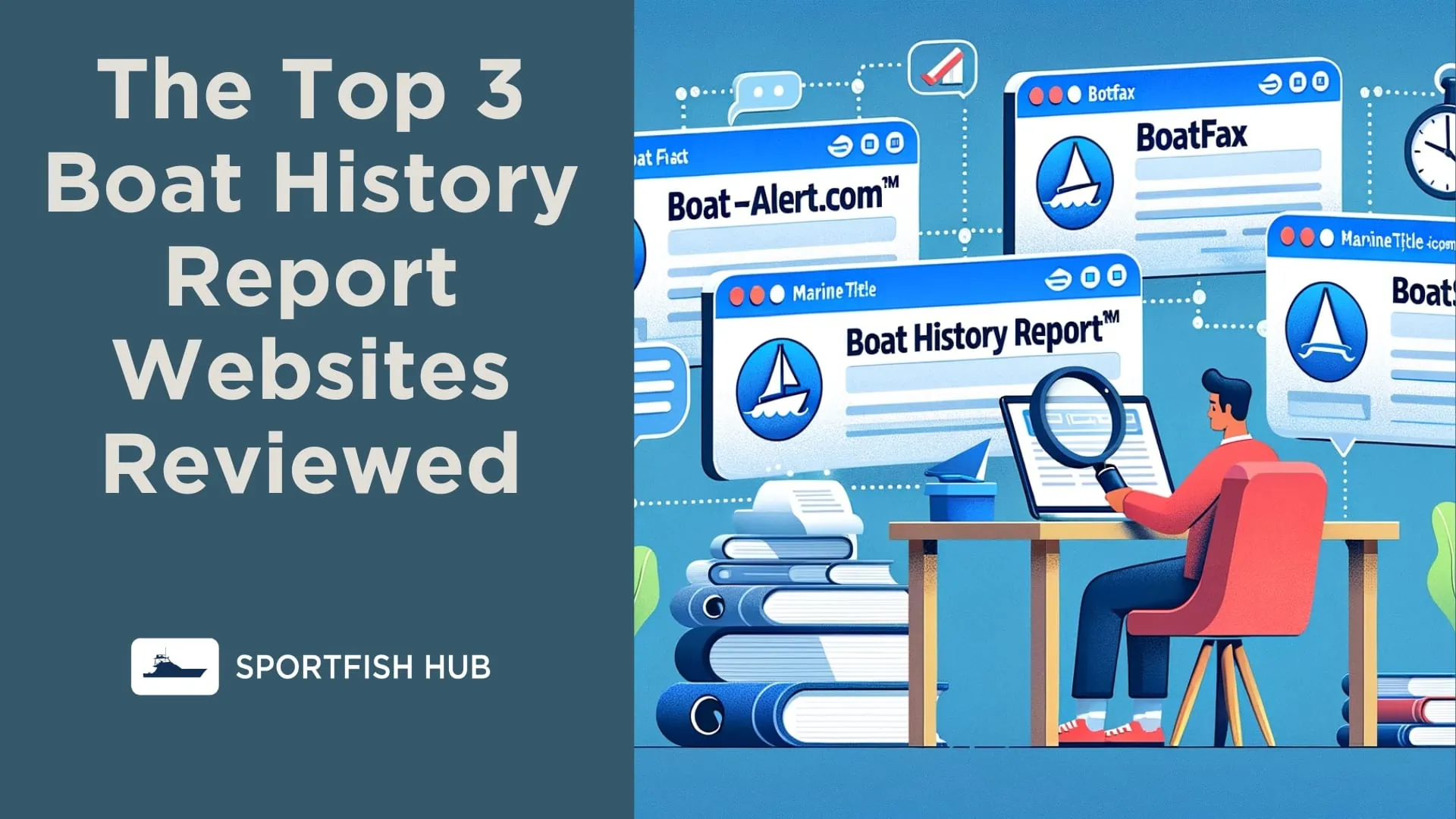Selling a boat can be challenging, but following these key steps will help you successfully sell your boat quickly and for top dollar:
Table of Contents
- Key Takeaways
- Prepare Your Boat for Sale
- Thoroughly Clean and Declutter the Boat
- Take Quality Photos and Videos
- How Much Is My Boat Worth?
- Pricing Your Boat Accurately
- List the Boat on Major Marketplaces
- Where to List Your Boat for Sale
- Interact Professionally with Potential Buyers
- Interacting Professionally To Sell A Boat Faster
- Complete the Transaction Smoothly
- Closing the Deal
- FAQs on Selling Boats
- FAQ’s
- Is it hard to sell a used boat?
- Do boats ever increase in value?
- Do boats have Carfax?
- Can I sell my boat without a broker?
- Does Boat Trader take a percentage?
- How long does it take to sell a boat?
- How much does a boat broker charge?
- What is the best place to sell a boat online?
- How much is my boat worth?
- What is the best way to sell a boat?
- Summary
Key Takeaways
- Clean and declutter your boat to maximize appeal
- Take high-quality photos and videos to attract buyers
- Research prices using online tools to set a fair asking price
- List your boat on boating marketplaces like Boat Trader and Boats.com
- Be responsive and transparent when interacting with potential buyers
- Have all necessary paperwork ready for a smooth sales transaction
Prepare Your Boat for Sale
To attract buyers and earn top dollar, prep your boat by:
- Deep cleaning the interior and exterior – Shampoo carpets, wax and buff surfaces, polish metalwork. Make it gleam.
- Removing clutter – Clear out personal items so storage spaces appear larger.
- Making minor repairs – Fix nagging issues like chips, leaks, squeaks.
- Detailing the engine – Clean, replace fluids, check for leaks. Get repairs done.
- Organizing records – Service history shows you cared for the boat.
- Checking the trailer – Ensure it’s roadworthy if selling a trailerable boat.
Leave your boat move-in ready. Consider hiring professionals to detail and make repairs beyond your skills.
Thoroughly Clean and Declutter the Boat
A clean, clutter-free boat will garner the most interest from buyers. Remove non-essentials and personal items so storage areas appear more spacious. Give the boat a deep clean inside and out, including bilges, cabinetry, canvas, and the hull. Consider hiring a professional boat detailing service for best results. Fix any cosmetic issues that may detract buyers.
Take Quality Photos and Videos
Great photos and videos are essential to attract buyers browsing online listings. Shoot photos during ideal lighting like sunrise or sunset to avoid glare and shadows. Get shots from multiple angles on and off the water. Take viewers on a virtual walkthrough with interior and exterior videos. Highlight special features and recent upgrades.
How Much Is My Boat Worth?
Set your asking price based on current market data. Online tools like Boat Trader’s Price Checker can provide estimates based on make, model, year and location. Review asking prices for similar boats in your area listed for sale online. Factor in upgrades and accessories. Consider getting a professional survey done. Price slightly above your target price to allow room for negotiation.
You might also want to read: Boat Price Trends for 2023-2024
Pricing Your Boat Accurately
Set your asking price based on:
- Online price checker tools – Boat Trader’s tool analyzes market data.
- Current listings – Search sites like Boats.com for comparable boats.
- Third-party value guides – NADA and BUC offer additional pricing context.
- Upgrades & accessories – Add-ons like electronics increase value.
- Maintenance records – Verifying care may support a higher price.
- Boat condition – Excellent condition boats fetch top dollar. Calculate costs to address issues.
Go high enough to allow negotiation room. Consider a marine survey to support pricing.
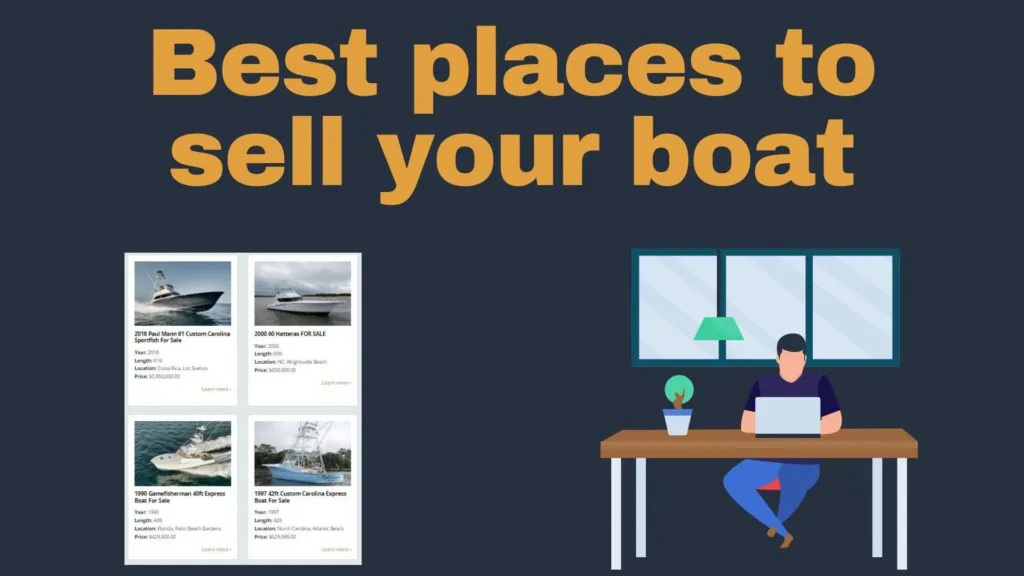
List the Boat on Major Marketplaces
The best way to sell a boat fast is to list it on boating marketplaces like Boat Trader, Boats.com and Craigslist. Create a detailed listing with specs, features and plenty of photos. Upgrade to a premium listing for maximum exposure. Local classifieds and social media can also expand your reach.
Where to List Your Boat for Sale
The best places to list a boat online are:
Cast a wide net by listing on boating sites as well as local online platforms.
| Website | Description |
|---|---|
| Boat Trader | A favorite among many boat sellers due to its wide reach and user-friendly interface. |
| boats.com | Known for having extensive boat listings, it’s a great place to list your boat and reach a global audience. |
| YachtWorld | Ideal for selling yachts and larger vessels. Note: You will need to list through a broker for exposure. |
| Craigslist | A popular choice for local listings, it can be a good option if you’re looking to sell your boat in your local community. |
| Boatcrazy | As the name suggests, this platform is all about boats and offers a dedicated audience of boat enthusiasts. |
| Boatexportusa.com | Specializes in exporting boats, making it a great choice if your target buyers are overseas. |
| Facebook Marketplace | With the vast user base of Facebook, listing your boat here can give it a lot of exposure. |
| iBoats | Offers a wide range of listings and is a popular choice among boat sellers. |
| SportfishTrader | If you’re selling a sportfishing boat, this platform could be the perfect fit. |
| eBay | Known for its auction-style listings, it can be a great place to sell your boat if you’re looking for a quick sale. |
Interact Professionally with Potential Buyers
Be responsive, friendly and transparent when communicating with prospective buyers. Answer questions thoroughly and provide additional photos or videos as needed. Set expectations ahead of time for sea trials and test rides. Disclose any known issues. Have all maintenance records and paperwork ready to share.
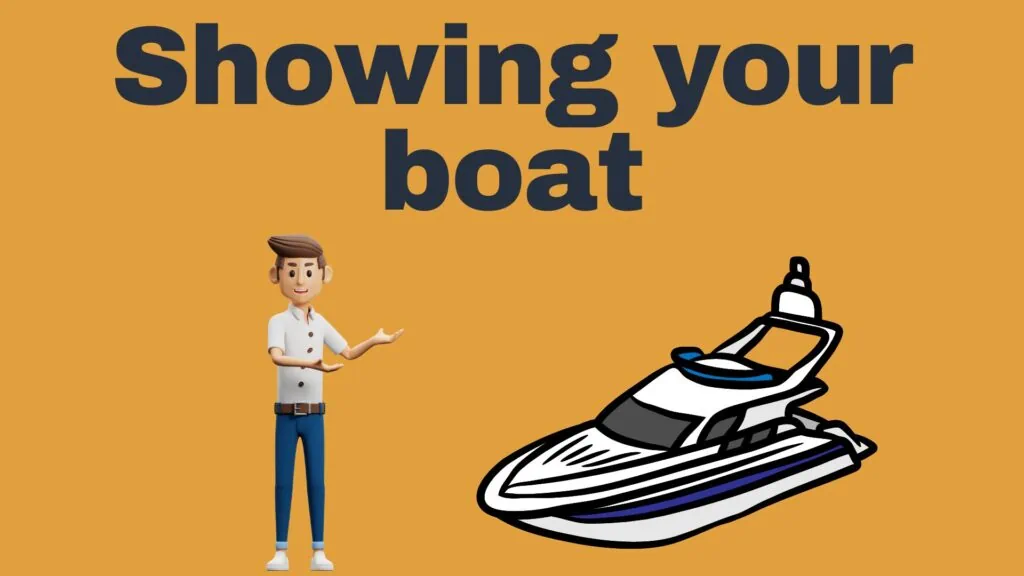
Interacting Professionally To Sell A Boat Faster
Make the process smooth by:
- Responding quickly to inquiries
- Sharing additional details and photos (More information builds trust)
- Explaining features and condition thoroughly
- Disclosing any defects or issues
- Answering questions openly and honestly
- Managing expectations ahead of sea trials
- Having paperwork ready to share
- Being transparent about why you are selling
Professionalism and preparation will lead to a good experience for both parties.
Complete the Transaction Smoothly
Once you agree on a price, ensure you have the proper paperwork like proof of ownership, title transfers, and a bill of sale. Only accept payment once it has fully cleared. Use an escrow service for large transactions if necessary. Properly disclosing details upfront will lead to a smooth sale.
Selling a boat on your own takes work, but following these key steps will help you be successful. With an increased focus on digital marketing and online listings, private sellers have more opportunity than ever to find motivated buyers for their boat.
Closing the Deal
To complete the boat sale:
- Review paperwork – Check requirements in your state. Have title, registration, bill of sale template ready.
- Verify buyer’s payment – Accept cash, wire transfer or certified check. Wait for checks to fully clear before releasing boat.
- Transfer ownership – Sign over title. Report the sale to the DMV.
- Remove insurance – Cancel your policy when the new owner takes possession.
- Remove branding – Take off any personalized names or designs.
Closing the transaction smoothly ensures you get paid and transfers legal ownership.
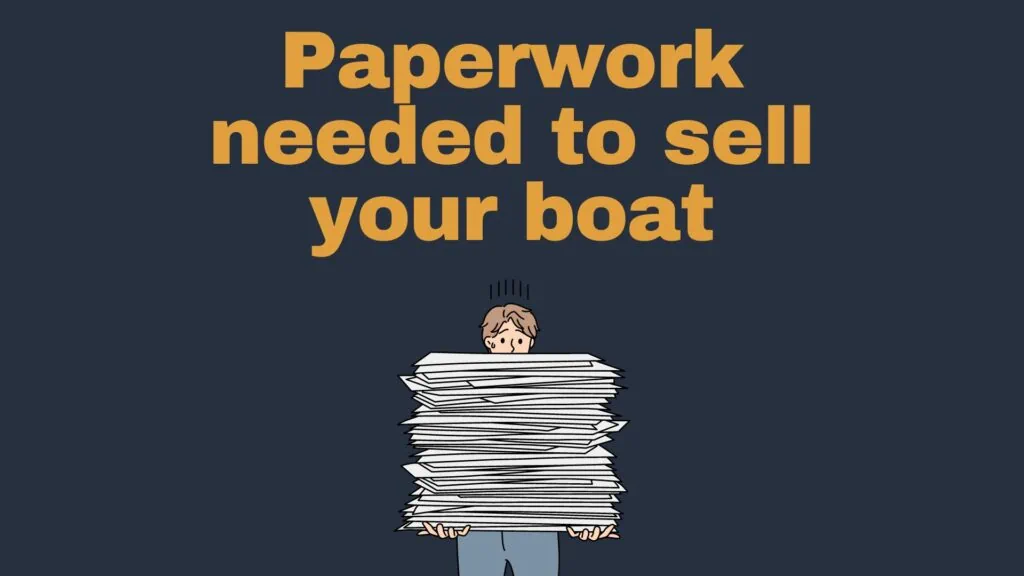
Paperwork You Need To Sell A Boat | |
|---|---|
| Title: | The boat’s title is the primary document proving legal ownership. You’ll need to sign it over to the buyer upon the completion of the sale. |
| Bill of Sale: | A bill of sale is a legal document that outlines the details of the transaction, including the sale price, buyer and seller information, and a description of the boat. Both parties should sign this document, and it’s a good idea to have it notarized for added security. |
| Maintenance Records: | Providing a comprehensive record of your boat’s maintenance history can help build trust with potential buyers and demonstrate that you’ve taken good care of the boat. Include receipts for repairs, routine maintenance, and any upgrades or modifications. |
| Warranty Information: | If your boat is still under warranty, provide the warranty information and any relevant paperwork to the buyer. This will give them peace of mind and potentially add value to the sale. |
| Registration and Licenses: | In many locations, boats must be registered with the appropriate authorities. Provide the buyer with a copy of the current registration, and inform them of any necessary steps to transfer the registration to their name. Additionally, if your boat requires specific licenses or permits, include these documents in the sale. |
| Insurance Information: | If your boat is insured, provide a copy of the insurance policy to the buyer. They may want to review the coverage and possibly continue with the same insurer. |
| Manuals and User Guides: | If you have the original manuals and user guides for your boat, its equipment, and any electronics, include these with the sale. These resources can be helpful for the new owner to better understand their boat and its features. |
FAQs on Selling Boats
FAQ’s
-
Is it hard to sell a used boat?
Yes, selling a boat can be difficult due to multiple factors: You have to have a boat that’s in good condition, you have to have the right market demand, then you have to have the right pricing strategy.
-
Do boats ever increase in value?
Yes, in recent years, due to low availability created by the supply chain, some boats are selling for more than their owners paid for them brand new.
-
Do boats have Carfax?
No, boats do not have Carfax or a Carfax equivalent. There are incident history reports for boats, but because damage and accidents are rarely reported to insurance companies unless they are serious, they are nowhere near as reliable as Carfax is with vehicles.
-
Can I sell my boat without a broker?
Yes, you can sell your boat without a broker, but as boats get bigger and more expensive, the process becomes more complicated, and this is where hiring a broker becomes advantageous.
-
Does Boat Trader take a percentage?
No, although Boat Trader listings are fairly expensive, they do not take a percentage of your sale.
-
How long does it take to sell a boat?
It typically takes 2-3 months to sell a used boat. Larger and more expensive boats may take longer, while boats priced under market value can sell within weeks. Listing during peak boating season will connect with the most motivated buyers.
-
How much does a boat broker charge?
Boat brokers typically charge a max of a 10% commission on the sale price, although it’s usually negotiable. Hiring a broker has benefits like access to buyer networks but reduces your proceeds.
-
What is the best place to sell a boat online?
The best websites to sell boats online are BoatTrader.com and Boats.com due to their huge boating audiences. Craigslist is good for inexpensive boats under $5,000. Facebook Marketplace and eBay also have a high number of real buyers.
-
How much is my boat worth?
The value of a used boat depends on make, model, year, engine hours, condition, upgrades and location. Online pricing tools like Boat Trader’s can estimate value based on market data. Third-party guides like NADA give a baseline for pricing.
-
What is the best way to sell a boat?
The best way to sell a boat is to advertise online with great photos, thoroughly prep the boat, price competitively based on market data, and remain transparent throughout the sales process. Casting a wide net by listing on multiple sites will maximize exposure.
Summary
Following key steps like preparing the boat, photographing it professionally, pricing it competitively and marketing it widely will help you successfully sell your boat. With boating demand still high, selling privately can help you maximize your proceeds.

